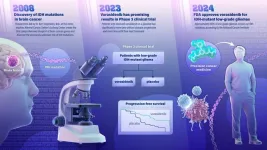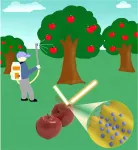(Press-News.org) FOR IMMEDIATE RELEASE
A new drug for treatment of a type of brain cancer, called IDH-mutant low-grade glioma, was approved Aug. 6 by the U.S. Food and Drug Administration (FDA). The promising new drug stems from a 2008 genetic discovery made at the Johns Hopkins Kimmel Cancer Center.
The drug, called vorasidenib, is a targeted cancer therapy that works by inhibiting the activity of a mutated gene called IDH, slowing the growth of the cancer. The gene was identified by Bert Vogelstein, M.D., and team at the Johns Hopkins Kimmel Cancer Center’s Ludwig Center in 2008 when they became the first to map the genetic blueprint for brain cancer. The blueprint was considered the most comprehensive genetic analysis for any tumor type, evaluating all known protein-encoding genes in brain cancer.
The researchers found that the IDH gene—which had never been suspected to be involved in any tumor type—was frequently mutated in a subset of brain cancers.
“IDH is the poster child for cancer genome sequencing, and it illustrates the importance of basic research,” says Vogelstein, the Clayton Professor of Oncology, Howard Hughes Medical Institute investigator, and co-director of the Ludwig Center. “The history of medicine shows that when a disease is understood, it eventually becomes manageable. It may not be immediately evident, but in time, as in this case, such discoveries result in better treatment for patients.”
Vogelstein and team’s genetic discoveries ushered in what is known as precision, or individualized, cancer medicine in which therapies are targeted to the unique genetic makeup of each patient’s cancer.
In June 2023, findings from a multicenter, phase 3 clinical trial of vorasidenib in 331 patients with IDH-mutant low grade glioma was published in the New England Journal of Medicine and concluded that patients with grade 2 IDH-mutant glioma who received the drug had significantly improved progression-free survival and that the therapy delayed the time to the next intervention compared to patients who received a placebo. The trial was sponsored by the international pharmaceutical company Servier, who is bringing vorasidenib to market.
In addition to this newly FDA-approved drug, the IDH gene discovery led to a new classification of gliomas, differentiating cancers with an IDH mutation that have overall better outcome and response to treatment from very aggressive gliomas without an IDH mutation, including glioblastoma, the most common primary brain cancer in adults. It has also paved the way for additional studies in other types of brain cancer.
Approximately 80% of low-grade gliomas contain an IDH mutation, according to the National Cancer Institute. They include IDH-mutant astrocytoma and oligodendroglioma, and they occur most commonly in younger adults. Low grade gliomas tend to be slower growing and are associated with longer survival than aggressive, high-grade gliomas.
Treatments include surgery to remove as much of the tumor as possible, followed by radiation and chemotherapy to attack remaining cancer cells. In some patients, the addition of the IDH inhibitor could delay the need for radiation therapy and chemotherapy.
“The possibility of delaying radiation therapy and chemotherapy with this drug could be beneficial to select patients with slow growing IDH-mutant gliomas,” says Matthias Holdhoff, M.D., Ph.D., co-director of the Johns Hopkins Kimmel Cancer Center brain tumor program and a co-investigator on the 2023 clinical trial. “I believe we are looking at a new standard of care option for these types of tumors.”
The Johns Hopkins University holds patents related to the IDH discovery, which have been licensed by Servier Laboratories. As a result of this licensing agreement, the University and its inventors, including Dr. Bert Vogelstein, are entitled to royalty distributions related to the IDH discovery. In addition, Dr. Matthias Holdhoff is a paid advisor to Servier, which provided funding for the study described in this press release.
END
FDA approves drug targeting Johns Hopkins-discovered brain cancer gene mutation
2024-08-07
ELSE PRESS RELEASES FROM THIS DATE:
LOINC® semiannual release: Global partners collaborate to enhance semantic interoperability with health terminology updates
2024-08-07
INDIANAPOLIS -- Regenstrief Institute’s latest LOINC® content update underscores significant strides in health terminology, accomplished through extensive collaboration with the international health community. The semiannual release aims to bolster the electronic exchange of clinical and laboratory data, fostering the use and implementation of LOINC standards across healthcare systems globally.
The Regenstrief Institute Health Data Standards (HDS) unit, which administers LOINC, and partners collaborated to create more than 3,000 updates, including ...
Researchers show pesticide contamination is more than apple skin deep
2024-08-07
Pesticides and herbicides are critical to ensuring food security worldwide, but these substances can present a safety risk to people who unwittingly ingest them. Protecting human health, therefore, demands sensitive analytical methods to identify even trace levels of potentially harmful substances. Now, researchers reporting in ACS’ Nano Letters have developed a high-tech imaging method to detect pesticide contamination at low levels, and its application on fruits reveals that current food safety practices ...
Current challenges evaluated for measuring and treating fatigue in multiple sclerosis
2024-08-07
East Hanover, NJ – August 7, 2024 – Kessler Foundation research scientist John DeLuca, PhD, has published a significant clinical article in Journal of Neurology, shedding light on the elusive nature of fatigue in multiple sclerosis (MS) and its implications for treatment. The study provides a comprehensive review of current challenges in defining, measuring, and treating MS-related fatigue, offering new insights and directions for future research.
The open access article, “Fatigue in multiple sclerosis: can we measure it and can we treat it?” (Doi: 10.1007/s00415-024-12524-9), was published on July ...
Disparities found in survival benefits for people receiving bystander CPR for cardiac arrest
2024-08-07
A National Institutes of Health (NIH)-supported study has found race- and sex-based differences in the increased chances of survival from people who received bystander cardiopulmonary resuscitation (CPR) for out-of-hospital cardiac arrest. Average survival benefits for cardiac arrest, when the heart suddenly stops beating, could be three times as high for white adults compared to Black adults and twice as high for men compared to women. The findings published in Circulation.
“CPR saves lives — that, we know,” said Paula Einhorn, M.D., a program officer at NIH’s National, Heart, Lung, and Blood Institute ...
Florey research finds association between prenatal exposure to plastics and autism in boys
2024-08-07
Florey researchers have found evidence of higher levels of the plastic chemical bisphenol A (BPA) in pregnant mothers who gave birth to sons with autism.
Research published in Nature Communications, led by Florey scientists Dr Wah Chin Boon and Professor Anne-Louise Ponsonby, supports the hypothesis of a possible link between autism and exposure to plastic chemicals in the womb.
Professor Ponsonby said the researchers analysed two large birth cohorts – the Barwon Infant Study (BIS) in Australia and the Columbia Centre for Children’s Health and Environment in the USA.
“Exposure to plastic chemicals ...
World’s highest-performance superconducting wire segment fabricated at UB
2024-08-07
BUFFALO, N.Y. — Our energy future may depend on high-temperature superconducting (HTS) wires. This technology’s ability to carry electricity without resistance at temperatures higher than those required by traditional superconductors could revolutionize the electric grid and even enable commercial nuclear fusion.
Yet these large-scale applications won’t happen until HTS wires can be fabricated at a price-performance metric equal to that of the plain copper wire sold at your ...
Bacterial gut diversity improves the athletic performance of racehorses
2024-08-07
The composition of gut bacteria of Thoroughbred racehorses at one-month-old can predict their future athletic performance, according to a new study from the University of Surrey. Foals with lower bacterial diversity at 28 days old also had a significantly increased risk of respiratory disease later in life.
Researchers from Surrey's School of Veterinary Medicine and School of Bioscience, led by Professor Chris Proudman, investigated the composition of gut bacteria in Thoroughbred foals bred for flat ...
Fishing is causing frightened fish to flee when they should flirt
2024-08-07
Populations of squaretail grouper face an uncertain future as new research shows fishing that targets their spawning sites is causing males to be repeatedly scared away from their territories during their short mating meet-ups.
By fleeing for safety, individuals are losing valuable time to catch the eye and court female fish.
A study, led by scientists at Lancaster University and published today in Biology Letters, shows that the impacts of fishing that targets squaretail grouper spawning sites goes beyond those fish that are caught, causing widespread behavioural change in those left behind.
These changes impact ability to reproduce. With disrupted mating, fewer offspring ...
Your best friend from high school? Here’s why their genes mattered
2024-08-07
Mom always said, “Choose your friends wisely.” Now a study led by a Rutgers Health professor shows she was onto something: Their traits can rub off on you – especially ones that are in their genes.
The genetic makeup of adolescent peers may have long-term consequences for individual risk of drug and alcohol use disorders, depression and anxiety, the groundbreaking study has found.
“Peers’ genetic predispositions for psychiatric and substance use disorders are associated with an individual's own risk of developing ...
How does an effective cancer therapy damage the heart?
2024-08-07
Cytotoxic T-lymphocyte antigen 4 (CTLA-4) is a protein receptor on T immune cells that prevents the cells from killing other cells, such as cancer cells. Blocking CTLA-4 with a specific antibody is an effective treatment for some cancers, but it can damage the heart. New research published in The FASEB Journal reveals the mechanisms involved in this side effect—a finding that could be used to help prevent it.
Experiments conducted in mice showed that blocking CTLA-4 activates certain T cells called Th17 cells, which increase inflammation. Inhibiting this activation reversed ...






